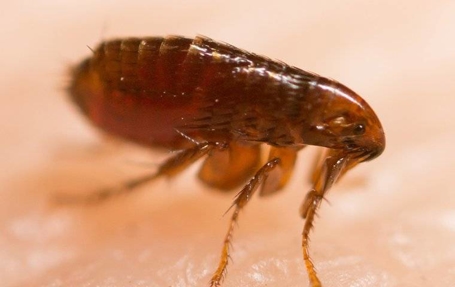
Fleas & Ticks

About
What are fleas and ticks?
Fleas and ticks are blood-feeding pests that regularly find their way into our California yards, where they develop into adults and attach themselves to the first hosts they come across. The preferred host of fleas and ticks are animals like cats, dogs, rodents, wildlife, and livestock. Both ectoparasites are also able to feed on human blood.
Fleas are tiny in size and have oval bodies flattened from side to side, are wingless, and have a pair of large back legs they use for jumping. Their body has a hard exoskeleton, which makes them very difficult to squish. Cat fleas and dog fleas live in our area, with only microscopic differences between the two species.
The two most common ticks that we find in our yards are the American dog tick and brown dog tick. Tick have oval-shaped bodies and are wingless; they are arachnids, and adult ticks have eight legs.
- The American dog tick is a brown tick with white or yellowish markings on its body.
- The brown dog tick is reddish-brown without noticeable markings, and turns grayish-blue when engorged.
Are fleas and ticks dangerous?
Fleas and ticks are dangerous because they can cause health problems in people and animals through their feeding habits. Ticks are vectors of diseases like Rocky Mountain spotted fever and tularemia that can make people very ill. Fleas spread some diseases, but the primary concern with these pests is the itchy rashes their bites cause. Flea bites are very itchy, and excessive scratching at the bite sites can lead to secondary infections.
Why do I have a flea and tick problem?
Whether you have pets as part of your family or are a pet-free household, it is important to understand that you can have a problem with fleas and ticks on your property.
The reason fleas and ticks are such a common pest problem to contend with is because they are continually being introduced onto our properties by wild animals. Once these pests get into your yard, it will only be a matter of time before you or your pets come into contact with them and bring them inside your home with you.
Another common way to experience a flea or tick problem in your home is after a rodent or other wild animal moves inside. Wild animals are notoriously infested with fleas and ticks. Fleas also hitchhike their way into homes on things like used furniture or rugs.
Where will I find fleas and ticks?
Outside, both fleas and ticks are found in damp areas of dense vegetation waiting for hosts to happen by that they can jump onto (fleas) or crawl onto (ticks). Moist soil found under leaf piles, shrubbery, decks, tall grass, and dense vegetation are all places you can potentially run into these pests. Fields, meadows, parks, and wooded areas can be infested with fleas and ticks.
Fleas are more likely to be a problem inside our homes than ticks. Fleas breed quickly, and just a few finding their way inside your house can soon lead to a large-scale infestation. Also, if environmental conditions aren't correct, flea eggs can remain dormant for long periods, making controlling fleas especially difficult.
How do I get rid of fleas and ticks?
Fleas and ticks are outdoor pests that can find a way into any of our California yards. Take back your yard from these nuisance and dangerous pests by partnering with a local professional. At ProServ Pest Management, our highly trained and experienced professionals will provide you with the services needed to remove these pests from your yard and, if need be, your home.
Our professionals are continuously trained on the latest pest control products, methods, and technologies, ensuring we can solve your pest problems! If you would like to learn more about eliminating fleas and ticks from your Sacramento area residential or commercial property, reach out to us today!
How can I prevent fleas and ticks in the future?
In addition to our home pest control and commercial pest control services, protect your property from pests with the following prevention tips:
- Mow your lawn frequently.
- Keep leaves raked up from your yard.
- Trim tall grass away from fencelines, playhouses, playsets, and ditch areas.
- Deter wild animal activity by keeping lids on trash cans, maintaining compost, and removing bird feeders.
- Remove overgrown landscaping and shrubbery from your yard that could provide harborage sites.
- Pets should be placed on a year-round flea and tick preventative under the guidance of a veterinarian.